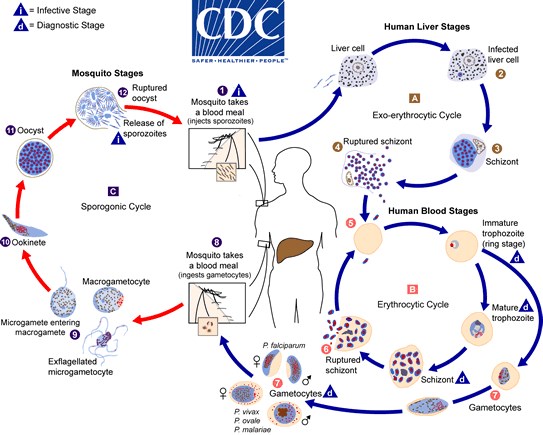Recently, the Centers for Disease Control and Prevention (CDC) issued an alert after five cases of malaria were confirmed in Florida and Texas. The cases are the first in 20 years to be acquired in the U.S., with no links to travel outside the country.
Malaria has been coming to the forefront and the health organisation has issued a Health Alert Network (HAN) to prevent people from falling sick. The mosquito-borne disease has not occurred in the United States since 2003 and it is becoming a cause of concern.
The CDC report states “CDC is collaborating with two U.S. state health departments with ongoing investigations of locally acquired mosquito-transmitted Plasmodium vivax malaria cases. There is no evidence to suggest the cases in the two states (Florida and Texas) are related.”
“In Florida, four cases within close geographic proximity have been identified, and active surveillance for additional cases is ongoing. Mosquito surveillance and control measures have been implemented in the affected area. In Texas, one case has been identified, and surveillance for additional cases, as well as mosquito surveillance and control, are ongoing,” it added.
With the rising tensions, there are possibilities to get confused between Malaria and Dengue. That is why it is important to learn the difference between the two mosquito-borne diseases.
What is Malaria?
Malaria is a mosquito-borne disease that is caused by a parasite which is transferred when an infected mosquito bites a human. Then the parasite cells reach the liver and multiply in number further travelling into the bloodstream and causing discomfort, fever, and chills.

Source: CDC
According to the CDC, there are four types of malaria parasites:
- Plasmodium falciparum
- Plasmodium vivax
- Plasmodium ovale
- Plasmodium malariae
Malaria is most common in tropical and subtropical regions, but it can also occur in temperate areas. The disease is spread by female Anopheles mosquitoes, which are found in areas with warm, humid climates. The symptoms of malaria typically appear 10-15 days after being bitten by an infected mosquito. However, the symptoms can also appear weeks or even months later.
According to WHO, there have been 247 million malaria cases in 2021 with 619,000 deaths.
What is Dengue?
Dengue is also a mosquito-borne disease that is caused by the dengue virus. It is spread through the bite of an infected Aedes aegypti or Aedes albopictus mosquito. These mosquitoes are found in tropical and sub-tropical regions around the world, including parts of the Americas, Southeast Asia, and the Pacific.
There are 4 types of dengue virus:
- DENV-1
- DENV-2
- DENV-3
- DENV-4
The symptoms of dengue typically appear 4-7 days after being bitten by an infected mosquito.
In some cases, dengue can develop into a more severe form called dengue hemorrhagic fever (DHF). DHF is characterized by bleeding from the nose and gums. It can also cause low blood pressure, shock, and organ failure. DHF is a life-threatening condition and requires immediate medical attention.
According to WHO, there were 5.2 million dengue cases in 2019.
Here is a list of differences between the two:
| Characteristic | Malaria | Dengue |
| Cause | Parasite (Plasmodium) | Virus (Dengue) |
| Transmitted by | Mosquitoes (Female Anopheles) | Mosquitoes (Aedes aegypti and Aedes albopictus) |
| Symptoms | Fever, chills, headache, muscle aches, fatigue, vomiting, diarrhoea, and cough | Fever, headache, muscle aches, rash, and swollen glands |
| Severity | Can be mild or severe, and can be fatal | Can range from mild to severe, with the most severe form being dengue hemorrhagic fever (DHF) |
| Treatment | Anti-malarial medication | There is no specific treatment for dengue, but supportive care can be given to help relieve symptoms |
| Prevention | Avoid mosquito bites | Avoid mosquito bites, and get vaccinated against dengue if travelling to an area where it is common |
In conclusion, both dengue and malaria are mosquito-borne diseases that can be fatal. It is essential to take necessary measures and get checked if any of the above symptoms arise. The Centers for Disease Control and Prevention suggest that malaria is a medical emergency and should be treated accordingly.
Comments
All Comments (0)
Join the conversation